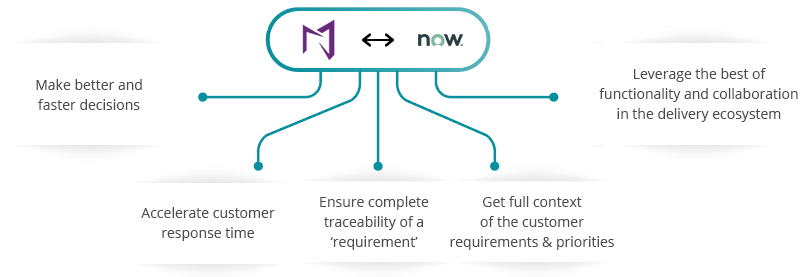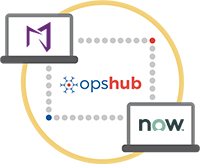Modern Requirements4DevOps Integration with ServiceNow
The integration of Modern Requirements4DevOps with ServiceNow helps the customer service and product management teams communicate efficiently, in real-time. This, in turn, helps resolve customer issues faster.
Schedule a free 30-minute live demo with our integration experts
Modern Requirements4DevOps – ServiceNow Integration Overview
In an Application Lifecycle Management (ALM) environment, the choice of systems and the collaboration between the cross-functional teams play a great role in delivering quality solutions. While the choice of systems impacts the productivity of a team, cross-functional collaboration helps the teams get complete context of the business requirements. Best-of-breed systems such as Modern Requirements4DevOps and ServiceNow bring rich functionalities to the ecosystem.
By integrating Modern Requirements4DevOps and ServiceNow, the customer service and product management teams would be able to collaborate better on the customer issues reported on the requirements. As the overall collaboration in the ecosystem would increase, the response time will go down and the quality of response would improve.
How Modern Requirements4DevOps – ServiceNow integration is beneficial for an enterprise
- Real-time access to customer issues and priorities
- Communication on the workitems from the native systems itself
- Real-time updates when a customer issue is resolved
With Modern Requirements4DevOps + ServiceNow integration, enterprises can:

How OpsHub Integration Manager integrates Modern Requirements4DevOps and ServiceNow
OpsHub Integration Manager integrates Modern Requirements4DevOps and ServiceNow bi-directionally. It ensures that all historical and current data is available to each user, in that user’s preferred system, with full context, in real-time. All ‘tickets’ from ServiceNow automatically synchronize to Modern Requirements4DevOps and all the entities and details associated with the ‘tickets’ synchronize back to Modern Requirements4DevOps.
Popularly synchronized entities

Use Case: Modern Requirements4DevOps integration with ServiceNow
Problem statement: The support team receives a ticket from a customer and shares it with the development teams via email. The development team and support team interact with each other and identify this ‘ticket’ as a defect. As the product management team is not kept in loop, they are not aware about the defect found in the product.
Solution: When Modern Requirements4DevOps, the development system, and ServiceNow are integrated using OpsHub Integration Manager, all three teams would be up-to-date about the status of the customer issue without manual exchange of information.
- The support team receives a ticket from the customer.
- The support team, then, shares it with the development teams via email.
- The development team identifies it as a defect.
- As the support, development, and product management systems are integrated, all the teams are up-to-date about the details of the new ‘defect’ found in the product.
- The development team later resolves the defect and updates it status to ‘closed. The change also reflects in ServiceNow and Modern Requirements4DevOps in real time.

Benefits of integration for Modern Requirements4DevOps and Micro Focus ALM/QC users
Modern Requirements4DevOps
users
- Traceability for business requirements throughout the ALM tool chain
- Visibility into customer issues and priorities
- Reduced dependency on manual communication for business decision making
ServiceNow users
- Access to the business requirements and associated updates from within ServiceNow
- Easy to categorize and transfer customer tickets to backend teams
- No manual efforts needed to keep product management teams on customer issues and priorities
